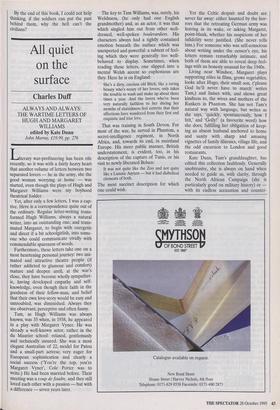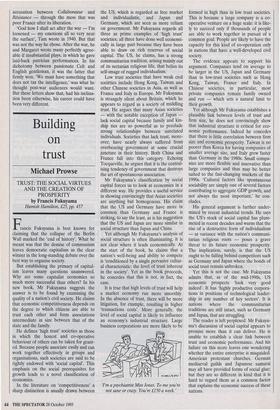All quiet
on the surface
Charles Duff
ALWAYS AND ALWAYS: THE WARTIME LETTERS OF HUGH AND MARGARET WILLIAMS edited by Kate Dunn John Murray, £19.99, pp. 276 Literary war-profiteering has been rife recently, so it was with a fairly heavy heart that another volume of letters between two separated lovers — he in the army, she the good woman worrying at home — was started, even though the plays of Hugh and Margaret Williams were my boyhood theatrical fodder.
Yet, after only a few letters, I was a cap- tive. Here is a correspondence quite out of the ordinary. Regular letter-writing trans- formed Hugh Williams, always a natural writer, into an outstanding one; and trans- muted Margaret, to begin with energetic and direct if a bit schoolgirlish, into some- one who could communicate vividly with commendable spareness of words.
Furthermore, these letters take one on a most heartening personal journey: two ani- mated and attractive theatre people (if rather addicted to glamour and comfort) mature and deepen until, at the war's close, they have become wholly sympathet- ic, having developed empathy and self- knowledge, even though their faith in the goodness of their fellow-man, and belief that their own love-story would be easy and untroubled, was diminished. Always they are observant, perceptive and often funny.
Tam, as Hugh Williams was always known, was 33 when, in 1938, he appeared in a play with Margaret Vyner. He was already a well-known actor, rather in the du Maurier school: relaxed, gentlemanly and technically assured. She was a most elegant Australian of 22, model for Patou and a small-part actress; very eager for European sophistication and clearly a social success (`You're the top, you're Margaret Vyner', Cole Porter was to write.) He had been married before. Their meeting was a coup de foudre, and they still loved each other with a passion — but with a difference — seven years later. The key to Tam Williams, was, surely, his Welshness, (he only had one English grandmother) and, as an actor, it was that which singled him out from other well- dressed, well-spoken boulevardiers. His characters always had a tightly contained emotion beneath the surface which was unexpected and powerful: a subtext of feel- ing which they were generally too well- behaved to display. Sometimes, when reading these letters, one slipped into a mental Welsh accent so euphonious are they. Here he is on England:
She's a dirty, careless old Bitch, like a raving beauty who's weary of her lovers, only takes the trouble to wash and make up about three times a year. And the lovers who've been very naturally faithless to her during her months of sluttishness feel contrite that their affections have wandered from their first and exquisite and true love.
That was training in South Devon. For most of the war, he served in Phantom, a secret-intelligence regiment, in North Africa, and, towards its end, in mainland Europe. His more public manner, British understatement, is evident, too, in his description of the capture of Tunis, or his visit to newly liberated Belsen:
It was not quite like the Zoo and not quite like a Lunatic Asylum — but it had diabolical elements of both.
The most succinct description for which one could wish. Yet the Celtic despair and doubt are never far away: either haunted by the hor- rors that the retreating German army was leaving in its wake, or asking Margaret, point-blank, whether his suspicions of her infidelity were justified. (She never tells him.) For someone who was self-conscious about writing under the censor's eye, his letters remain remarkably intimate, and both of them are able to reveal deep feel- ings with an honesty unusual for the 1940s.
Living near Windsor, Margaret plays supporting roles in films, grows vegetables, looks after Hugo, their small son, (`please God he'll never have to march' writes Tam,) and liaises with, and shows great kindness to, the wives and mothers of the Rankers in Phantom. She has not Tam's natural way with language, but writes as she says, 'quickly, spontaneously, how I felt,' and 'Golly!' (a favourite word) how she does; fulfilling her obligation of keep- ing an absent husband anchored to home and sanity with sharp and amusing vignettes of family illnesses, village life, and the odd excursion to London and good restaurants.
Kate Dunn, Tam's granddaughter, has edited this collection faultlessly. Generally unobtrusive, she is always on hand when needed to guide us, with clarity, through the North African Campaign (she is particularly good on military history) or with its endless accusation and counter- accusation between Collaborateur and Resistance — through the mess that was poor France after its liberation.
`God how I shall act after the war — I'm loosened — my emotions all so very near the surface', Tam wrote in 1940. But that was not the way he chose. After the war, he and Margaret wrote many perfectly agree- able if insubstantial plays, in which he gave laid-back patrician performances. In his dichotomy between passionate Celt and English gentleman, it was the latter that firmly won. 'We must have something that does not tax the intelligence,' was what he thought post-war audiences would want. But these letters show that, had his inclina- tion been otherwise, his career could have been very different.



































































 Previous page
Previous page